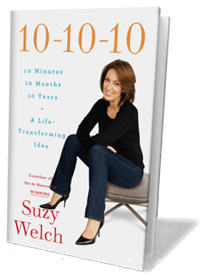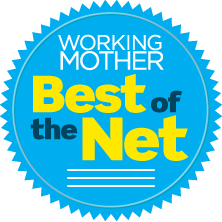 The folks at MomCentral sent me a review sample of Suzy Welch’s new book
The folks at MomCentral sent me a review sample of Suzy Welch’s new book
10-10-10: A Life-Transforming Idea. From the cover, it looked like another “self-help” book. Since I’m not a big fan of that genre, I’ll admit that I only cracked open 10-10-10because of Suzy Welch’s…ahem…notoriety.* But I kept reading because the 10-10-10 idea actually made sense.
10-10-10 is a decision-making practice that helps you make tough choices based on your values rather than out of guilt, stress or expediency. 10-10-10 challenges you to determine how decisions impact your life immediately, in the short term, and in the long term.
This framework clarifies the decision-making process. So often we are moved to action because of guilt, because of a child’s demands, the last-minute request of a boss or colleague, or because we think we have no other options.
When you use the 10-10-10 framework, you consider your options and their consequences in ten minutes, ten months, and ten years. The right decision is the one that aligns the consequences with your personal values.
10-10-10 doesn’t minimize the pain or the consequences of the tough-decisions we all face in life, but it does help you feel more confident about your choice. When you live a life that is aligned with your personal values, you are prepared to deal with the consequences of your actions and better able to explain the reasons for your decision to family and coworkers.
The book is full of compelling anecdotes from people Suzy has met over the years as well as her own experiences as a working mom. For example, Suzy had to decide between attending her son’s black belt karate test or an important work off-site that would impact her chances of receiving a promotion. She leads us through her 10-10-10 decision-making process. Ultimately, she chose to attend the karate test even though she understood the consequences to her career since her priority was maintaining a loving and trusting relationship with her son.
Suzy’s candor about her personal life was particularly refreshing. She writes openly about mistakes she’s made and why she was fired from her job at the Harvard Business Review. By doing so, she both humanizes herself and shows the consequences of what happens when you make a decision without running it through the 10-10-10 framework.
I didn’t expect to like this book or anticipate that it would change my previous impression of Suzy Welch. But when I finished the last page, I had a new respect for Suzy Welch and a new method for making tough decisions.
* Back in 2002, Suzy Welch was forced to resign from the Harvard Business Review after admitting to an affair with the then-married Jack Welch, the former chief executive officer of General Electric, while preparing an interview with him for the magazine.
